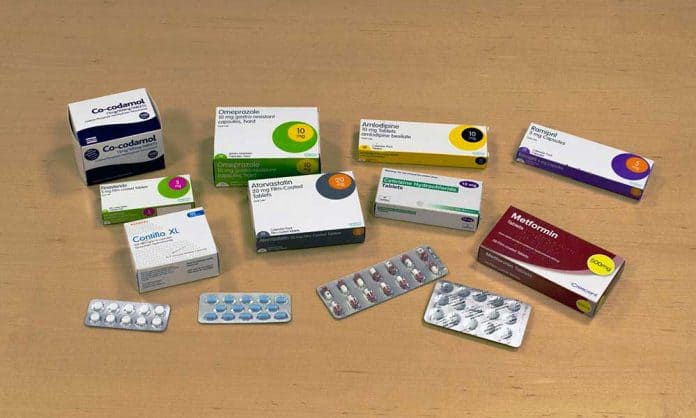
If you’re planning a trip to Ireland and rely on prescription medication that you need to take regularly, then it goes without saying that you should pack enough for your trip… but there is a lot more to consider.
Flying with prescription medications isn’t always easy, and the best thing that you can do to make sure you stay on the right side of the law is to educate yourself.
Some medications can be freely purchased over-the-counter (OTC) in Ireland (for example, Aspirin and Ibuprofen).
In these cases where you are not on a prescribed daily dose, it is convenient enough to buy them as and when needed.
In other cases involving stronger and prescribed medications a bit more attention needs to paid when packing.
Some common questions are:
- What are the rules for traveling to Ireland with medications? (Read on to find out)
- Do prescription drugs have to be in original containers when flying? (Yes)
- Is Xanax allowed in Ireland? (Prescription only)
- Is Codeine illegal in Ireland? (No)
- Do they sell Codeine over-the-counter in Ireland? (Yes)
- Can you buy Pseudoephedrine in Ireland? (Yes)
If you need to take prescription medications that are not available over the counter or medications that are available over the counter in your country, but unsure about Ireland then read on…
Restrictions and Medical Certificates
For some medicines – like sleeping pills, medication for ADHD and strong painkillers – you need a medical certificate. This can be obtained from your Doctor.
Talk to your Doctor or practice nurse about your travel plans at least 2 months before your departure date.
Is Xanax Allowed in Ireland?
Xanax is only available from a pharmacist with a prescription from a doctor. Due to their potential for abuse, Benzodiazepines are controlled substances in Ireland.
If you wish to bring some with you from your home country, you will need to carry a prescription with you.
Can You Buy Codeine over-the-counter in Ireland?
In Irish law, Codeine is classed as Schedule 5 under the Controlled Drug Regulations meaning that it is available to patients over the counter in pharmacies under supervision of a pharmacist who should make the patient aware of the side effects.
You can expect to be fully interrogated if you try to procure it (and rightly so due to addictive nature and possibility of abuse/misuse).
Can You Buy Pseudoephedrine in Ireland?
Yes, Pseudoephedrine products can be bought over-the-counter in Ireland.
Pseudoephedrine is a nasal decongestant active ingredient available in over-the-counter (OTC) medicines that relieve a stuffy nose or sinus pressure due to the common cold or other ailments.
Common brands sold in Irish pharmacies containing pseudoephedrine:
- Advil®
- Clarityn®
- Sudafed®
- Store Brands (ex. Walmart’s “Equate” store brand)
Are Anti-biotics Available OTC in Ireland?
All antibiotics in Ireland are prescription-only. However, some pharmacists can prescribe them for you, particularly in the smaller rural areas where surgeries are few and far between.
Make sure that you bring enough with you for the duration of your stay or the length or the course.
How to Fly Legally with Medications
To travel with medication legally you should always keep medications in their original containers.
Keep your prescription medication in its original packaging, even if this takes up more space in your luggage that you would like.
There are several reasons why this is important…
Firstly, this will ease your passage through airport security.
Secondly, it will make it easy for medical professionals to see what medication you are on in the event of your falling ill and/or there being a language barrier.
The flying with medication rules might seem rather strict, but they are there for the protection of passengers.
As long as you abide by all the rules, correctly package your medication and carry proof that it was prescribed for you, you won’t experience difficulty or delays.
How To Pack Medication For a Flight
Pack it in your hand luggage. If you require medication, you will always be allowed to take this on to the plane with you.
All documentation relating to your medication needs to be in your hand luggage as well.
It’s not a bad idea to carry photocopies of the documentation in your hold luggage, just so you have spares in the event that you misplace the originals at the airport bar.
What Documentation Is Needed When Flying
Carry your original prescriptions wherever possible, and copies if not. If relevant, also take a letter from your doctor.
It’s a good idea to leave copies of any original documents at home with a friend or relative in case you find yourself in difficulty and need to have your original documents scanned and sent to you whilst away.
I like to keep scanned digital copies of all important documents in my Dropbox account – so they’re easily accessible anywhere with an internet connection.
This would be handy if you luggage was misplaced with all your medications and documents – at least you can visit a local doctor and provide them with full information to issue replacements.
Costs of Medicines in Ireland
If you want to find out the typical costs of over-the-counter medicines before you arrive, take a look on the Inish Pharmacy website.
If certain items are particularly more expensive than in your home country, you going to want to take a supply with you.
Obtaining Medicine in Ireland
Basic medication for things like colds and flu, sore throats, stomach upsets, minor cuts and mild sprains are widely available at pharmacies in Ireland – more commonly known as chemists.
You will find them on most high streets and in shopping centres, and all but the smallest villages will have one.
You can also find basic medications in supermarkets, petrol stations and convenience stores.

If you need non-urgent medical assistance, pharmacy staff will be able to provide advice on many common ailments.
If they are unable to help or suspect you might need further medical attention, they will advise you on the best way to proceed. If they think you need to see a doctor, the pharmacist should be able to put you in contact with the nearest GP’s surgery to ask for advice.
GP’s (General Practitioner’s – doctors who deal with everyday illnesses) are available in all areas of Ireland, and many will treat tourists or visitors to the area.
GPs can prescribe medication that is not available over the counter.
In the event of an emergency, skip the pharmacist and immediately call 999 for an ambulance – 999 is the emergency services phone number in Ireland.
Preparing for Your Trip
Ensure that you bring an adequate supply of your prescription medication that will last for your entire trip, and include some extra in case you are delayed on your travels.
Always pack your original prescriptions, and keep them in your hand luggage along with copies ideally. You might be asked to show these at airport security checks to demonstrate the requirement to carry the medication.
Before you set off with medication internationally, check whether your medications are legal in Ireland.
Just because they are OTC in your home country, doesn’t mean they will be in other places.
If you have not found an answer for you particular medicine then contact the Irish embassy in your country and ask for advice.

